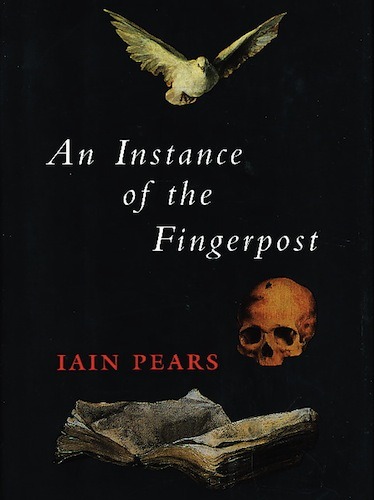The full-immersion historical novel isn’t an easy one to get right. It’s easy to get bogged down in irrelevant contemporary details, info-dumps in the form of history lessons, or archaic speech. Or it can be a failure of overarching style, as novels written in the 18th and 19th centuries in particular (popular periods for period books) are for the most part extremely well-structured, a feat not every novelist can achieve. An Instance of the Fingerpost manages to avoid most of these pitfalls, presenting a vibrant and highly compelling 17th century England, but outside the traditional bustle and filth of London. The structure of the book is also compelling, and as soon as you detect it, the depth and your own interest increases.
Spoiler warning. As soon as you find the book is broken into several shorter narratives concerning the same event, you start willing the author to succeed. After all, many such attempts at nonstandard storytelling fail, often because the structure is only there as a spice, rather than as the meat of the book. This book’s four-part story and unreliable narrators are foundational.
In An Instance of the Fingerpost, the structure is very important, and it does not fail except perhaps in subjective ways. The plot is centered around the death of an Oxford professor in Restoration-period England, when the Enlightenment is around the corner but in the meantime all is ruled by religious conformity and a desire to settle down after decades of war and turmoil. Many of the characters are in fact taken from that period of history: real scientists, politicians, religious figures. The narrative is fictional but lies lightly on top of the true history – a “what if” situation that unravels farther in each successive narrative and increases the scope of the plot.
Pears’ writing is faultless and enjoyable, and the voices of the different characters noticeably different. His research and care in making Oxford and its inhabitants period-accurate, yet relatable and realistic, are admirable. In my opinion the last period stumbles the most, as it is necessarily the “straight” narrative and you are unoccupied in attempting to suss out the inaccuracies and outright lies being woven in.
It is a long book, nearly 700 pages in my paperback edition, and while I wouldn’t call the pace slow, it’s not fast, either. It is at least steady. As far as modern historical fiction goes, An Instance of the Fingerpost is a delightful and compelling read, though readers for whom political intrigue and playful scholarly allusions are tiring will want to pass it by.

